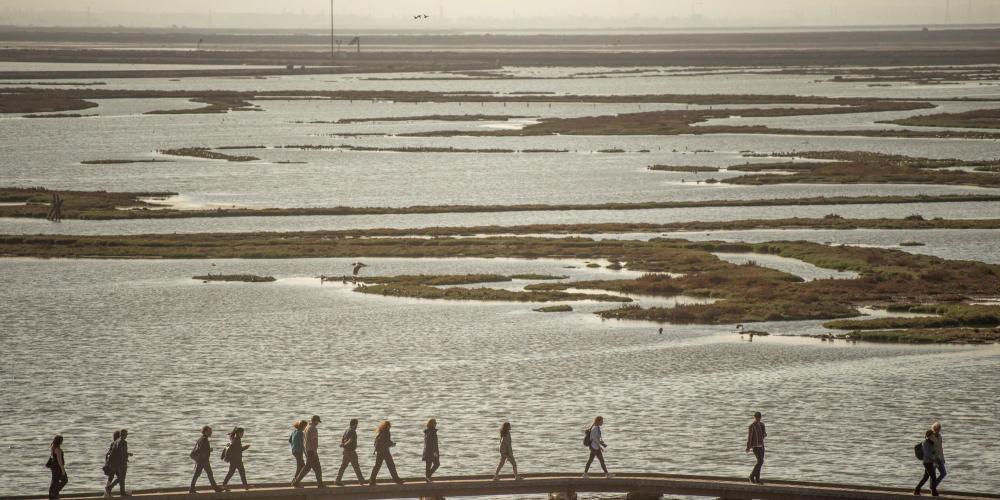
The Bay Area is the beneficiary of $32 million in water quality grants to protect fish passages in Richmond, build rain gardens at schools in underserved areas of Petaluma and provide flood protection in San Jose, among other projects.
The projects will be implemented over the next three to five years under the administration of the San Francisco Estuary Partnership. The grants are provided through the Integrated Regional Water Management Program, funded by the California Department of Water Resources. Grant awards for the Bay Area are selected by a regional coordinating committee.
"I'm excited to see this funding support local projects across the region," said James Muller, the Estuary Partnership's Principal Program Manager. "These on-the-ground projects will remove fish passage barriers, increase freshwater flows in local creeks, reduce water use, and help plan for climate change."
Among the key projects funded:
$1.5 Million to Contra Costa County Flood Control and Water Conservation District (North Richmond)
The Wildcat Creek Fish Passage Implementation Project will improve fish passage, reduce sediment and trash in Wildcat Creek, and reduce localized flooding risks in low-lying areas of the City of San Pablo. The constructed project will provide North Richmond residents greater access to nature and opportunities for outdoor recreation in an underserved community.
$1.5 Million to Daily Acts Organization for Climate Resilient Schools (Petaluma)
The Climate Resilient Schools project will install multi-benefit rain catchment, rain garden, native tree planting, turf conversion, and irrigation efficiency projects at up to four school sites located in underserved neighborhoods of Petaluma, building drought resilience, creating habitat and providing living learning landscapes for the students and community. In addition, this project will provide water conservation and stormwater infiltration benefits throughout the community. In addition to building drought resilience and infiltrating stormwater, this project will support schools in planting trees to reduce urban heat island effects from asphalt play areas and install habitat for pollinators and wildlife, while building fire resilience.
$3.8 Million to Valley Water for Coyote Creek Flood Protection Project (San Jose)
The Coyote Creek Flood Protection Project will reduce localized flooding for homes along Coyote Creek in the City of San Jose. The neighborhood adjacent to this section of Coyote Creek has experienced repeated flooding and is highly vulnerable to future floods. The project will install flood walls, berms, passive barriers, and retaining walls to better contain flood flows within Coyote Creek and protect nearby homes, schools, businesses, and the local fire station. Flood walls will include “green screening” and nature-based solutions such as vegetated berms and riparian plantings that will improve the creek ecosystem. Other goals of the project include enhancing Coyote Creek’s overall health and habitat by improving water quality and bay ecosystems, creating a self-sufficient natural system to reduce the need for maintenance, and aligning with recreation and public access needs important to neighborhood vitality.
Other funded projects include:
- Contra Costa Resource Conservation District: Ambrose Center Park Green Infrastructure Enhancements ($1,595,650)
- Marin Municipal Water District: Marin City/San Rafael Water Supply Resilience Project (Marin City and San Rafael) ($6,408,000)
- San Mateo Resource Conservation District: Drought Resiliency and Water Conservation Program ($4,989,803)
- San Francisquito Creek Joint Powers Authority: Urban Reach 2 San Francisquito Creek Flood Protection and Ecosystem Restoration Project (San Mateo County) ($3,799,087)
- Zone 7 Water Agency: Flood Management Plan Decision Support Tools (Alameda County) ($827,478)
- Zone 7 Water Agency: Water Supply Risk Model Enhancements and Optimization (Alameda County) ($130,000)
- Roseview Heights Mutual Water Company: Infrastructure Upgrades for Water Supply and Quality Improvement (Santa Clara County) ($300,000)
- City of Burlingame: Advanced Metering Infrastructure Upgrade and Customer Engagement Project ($1,009,232)
This round of Integrated Regional Water Management Program funding prioritized the needs of underserved communities and Tribes, including projects identified in the community-driven Regional Water Needs Assessment.
"I'm thrilled that the region used selection criteria that prioritize the needs of underserved communities and Tribes for this round of funding," Muller said. "That approach has resulted in an estimated $13 million of grant funds that will directly benefit disadvantaged and underserved communities and Tribes. The region has a lot to be proud of."
The Bay Area Integrated Regional Water Management Plan is a nine-county effort funded by California voters to coordinate and improve water supply reliability, protect water quality, manage flood protection, maintain public health standards, protect habitat and watershed resources, and enhance the overall health of San Francisco Bay.
The program started in 2002 with the passage of the Regional Water Management Planning Act. Since then, California voters have approved more than $2 billion in bond funds to plan and implement over 1,450 integrated, multi-benefit regional projects across the state.



Submit your comment
In order to receive a reply to your comment, please provide an email address.